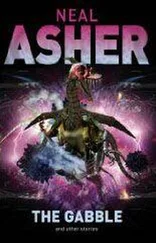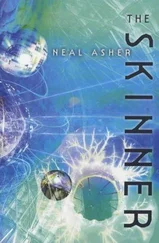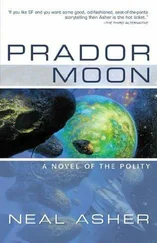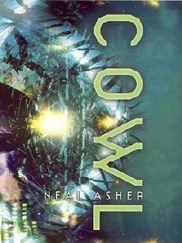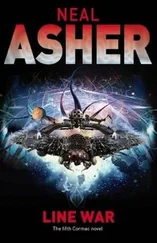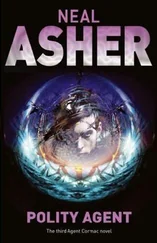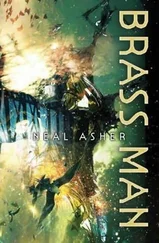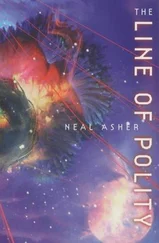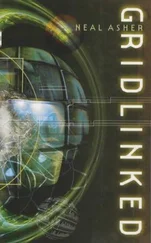Neal Asher - Zero Point (Owner Trilogy 2)
Здесь есть возможность читать онлайн «Neal Asher - Zero Point (Owner Trilogy 2)» весь текст электронной книги совершенно бесплатно (целиком полную версию без сокращений). В некоторых случаях можно слушать аудио, скачать через торрент в формате fb2 и присутствует краткое содержание. Жанр: Старинная литература, на английском языке. Описание произведения, (предисловие) а так же отзывы посетителей доступны на портале библиотеки ЛибКат.
- Название:Zero Point (Owner Trilogy 2)
- Автор:
- Жанр:
- Год:неизвестен
- ISBN:нет данных
- Рейтинг книги:3 / 5. Голосов: 1
-
Избранное:Добавить в избранное
- Отзывы:
-
Ваша оценка:
- 60
- 1
- 2
- 3
- 4
- 5
Zero Point (Owner Trilogy 2): краткое содержание, описание и аннотация
Предлагаем к чтению аннотацию, описание, краткое содержание или предисловие (зависит от того, что написал сам автор книги «Zero Point (Owner Trilogy 2)»). Если вы не нашли необходимую информацию о книге — напишите в комментариях, мы постараемся отыскать её.
Zero Point (Owner Trilogy 2) — читать онлайн бесплатно полную книгу (весь текст) целиком
Ниже представлен текст книги, разбитый по страницам. Система сохранения места последней прочитанной страницы, позволяет с удобством читать онлайн бесплатно книгу «Zero Point (Owner Trilogy 2)», без необходимости каждый раз заново искать на чём Вы остановились. Поставьте закладку, и сможете в любой момент перейти на страницу, на которой закончили чтение.
Интервал:
Закладка:
‘I am impressed,’ said Serene, as she piloted the big aero down towards the landing deck. ‘I didn’t expect them to be ready so soon.’
The manager of the new project was a marine biologist called Michael Palgrave, a thin severe-looking man with blond hair and a badly sunburned nose, who stood nervously behind her; Sack was in the seat behind him, arms folded and a bored expression on his lizard face.
‘We had the robots here, and it was simple enough to get them to strip out the cell partitions inside the old oil tanks,’ he replied. ‘We then constructed the nursery pools on the old prison floors and utilized plumbing already in place to get things started. It took longer to automate the sea-seeding system, and we have had problems with the stock.’
‘I understand,’ said Serene, quite happy to let the man ramble on because she was pleased with what was happening here.
As she finally settled the aero down on the landing pad, she glanced towards land and noted the green smear extending out across ten kilometres of sea. This was why they had chosen this area for the releases. The Dubai swamps had soaked up over two hundred million Scour victims and thus become poisonously anaerobic. However, from them this algae bloom had spread out to sea, and just beyond it the sea plankton had undergone a resurgence. There was food here now: microscopic food but billions of tonnes of it. She silently thanked the erstwhile rulers of the small but wealthy country that had once lain inland.
After surviving international crashes of the financial system with copious oil money, the rulers of Dubai had continued their project of turning their country into a tourist destination in readiness for when the oil ran out. After building the Palm Tree and the World island groups on their coastline, they became more ambitious and transformed that coastline from end to end. However, to maintain all this required the constant work of massive dredgers and underwater silt pumps the size of mosques. This was all fine while the oil money flowed and as it began to wane, when the influx of wealthy tourists took up the slack.
Serene stepped out of the aero behind her close-protection team, Sack immediately behind her and Palgrave a step behind him. She waved the marine biologist forward to stand beside her as her various PAs and other staff also exited the aero. ‘So where first?’
He pointed ahead to one of the new buildings erected on the hectares of deck. ‘We call it the panoquaria. It’s where we harvest eggs, milt and spores from the adult fauna and flora, and it also serves as the hatchery.’
‘Lead on,’ said Serene happily, flicking another glance back towards the coast, and considering the disasters that occurred there before she was born.
The first oil-quake, which dropped the Burj Al Arab hotel and its population of four hundred and eighty billionaires into the ocean and left the Burj Khalifa tower tilted at twenty degrees, was also the first nail in the lid of the coffin constructed by Middle Eastern fundamentalism. Other nails were soon to follow. No one knew who had fired the missile at Tel Aviv from Iraq, but the warhead the ancient SCUD carried could only have come from Iran’s shiny new collection. Mossad was blamed for the detonation of a similar device in a Baghdad cellar, and was also held responsible for the air-burst biological weapon detonated over Mecca during the Hajj, but that was only after the month-long incubation period of the virus, when it started killing returning pilgrims, as well as their families and friends around them.
After her close-protection team had checked what lay ahead, then signalled an all-clear, Serene followed Palgrave into the new building and gazed round in wonder. Along a row of tanks a group of human workers clad in hazmat suits – which were actually not protection for them but for what they were handling – were netting fish from tanks and gently squeezing milt and eggs from them into containers strapped to their waists. To her right a long, low aquarium swarmed with shrimp, while in others she spied prawns, crabs and various other crustaceans.
As she gazed at these, Serene considered the final chapters in the disaster that occurred inland of here. Resources – it was always about resources. As it was finally recognized that the human race had passed over the Hubbert Peak – that Peak Oil had passed – and as new technologies were finally taken out of the laboratory and applied across the world, Middle Eastern fortunes began to wane as oil magnates tried to cash in by overpricing a failing resource. The result of this was that the fundamentalists hereabouts soon learned that religious tolerance began and ended at the petrol pump, and no one felt any inclination to build the new fusion reactors in lands which, in public perception, had constantly supplied the world with bearded lunatics with strap-on bombs or home-brewed biological weapons.
When the Golden Decade came to an end in an overpopulated world where food and fresh water were running out and financial systems imploding, barren desert countries were the first to suffer, no matter how fat the bank accounts of their rulers. Then, as the nascent Committee gleefully began applying confiscatory taxes, Middle Eastern fortunes plummeted further. Here in Dubai the money eventually ran out and the island project failed, the island groups dissolving into a saltwater swamp that swallowed all the millionaire condos and tower blocks. But it was a failure Palgrave was now making use of.
‘The fiddler crab population here shot up just after the Scour,’ explained Palgrave, breaking into her thoughts as he pointed at a tank containing some examples of that species, ‘then it crashed with the spread of a very specific fungal infection. That’s our problem, you see. Monocultures are susceptible to that sort of thing, so we need more variety.’
‘I am aware of that,’ Serene replied, frowning, a little of the sunshine going out of her day, ‘which is why, as you must be aware, the Scourge has gone after Argus Station. Once we have recovered the Gene Bank data and samples, we can introduce more variety.’
‘Though admittedly,’ Palgrave hurriedly added, ‘every day we’re rediscovering species long thought to be extinct. All it takes is one or two surviving eggs or spores on the seabed . . .’
There had been some cheering news over the last few months. Some old varieties of bees had been discovered building colonies in defunct agricultural plants – bees thought to have been wiped out in the twenty-first century by mite infections. Serene often found herself now wondering if Earth’s biosphere could recover without all that stuff from the Gene Bank. However, every time her hopes were raised, something else came along and dashed them. The Mediterranean octopus was one example. Amazingly it still existed, yet the proof of that was only washed up on the shore after big infrastructure crashes in the Peloponnese had led to a case-hardening plant dumping a few billion gallons of toxic waste into the sea.
From the panoquaria they headed down below decks to the nursery tanks, all swarming with fish fry, crustaceans, mollusc larvae and seaweed spores. This place gratifyingly smelt of life, of renewal, of new beginnings.
‘It’s begun,’ said Palgrave, pointing out one tank as it began to drain, its tonnes of fish fry draining out through metre-diameter pipes to outlets all along the sides of this erstwhile supertanker. She followed him along two kilometres of aisles, never feeling any of the inclination to boredom she felt in scramjet or space-plane construction plants. At one point, noting their lack of enthusiasm, she dismissed her PAs back up to the deck, retaining only Sack and her close protection team. By the time, four hours later, she reached an elevator leading back up to the deck, many of the nursery tanks had emptied and were now refilling with filtered and purified seawater.
Читать дальшеИнтервал:
Закладка:
Похожие книги на «Zero Point (Owner Trilogy 2)»
Представляем Вашему вниманию похожие книги на «Zero Point (Owner Trilogy 2)» списком для выбора. Мы отобрали схожую по названию и смыслу литературу в надежде предоставить читателям больше вариантов отыскать новые, интересные, ещё непрочитанные произведения.
Обсуждение, отзывы о книге «Zero Point (Owner Trilogy 2)» и просто собственные мнения читателей. Оставьте ваши комментарии, напишите, что Вы думаете о произведении, его смысле или главных героях. Укажите что конкретно понравилось, а что нет, и почему Вы так считаете.


